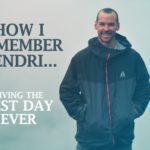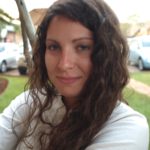Matthew Fader (Sweden)
… Hendri affected our lives in such an incredible and positive way…
When I moved from California to Sweden in 1998, I started Swedish language classes with other immigrants and refugees. In my class, was a man from Uganda who told me of some wondrous places in his country, including the Ruwenzori Mountains. I began to research The Mountains of the Moon as they are also known and found them incredibly intriguing, due to the incredible nature and culture that surrounded them. Unfortunately, the instability in the region had forced the national park to close for the greater part of the 90´s. Meanwhile I planned the expedition as much as possible. Finally, in late 2001, officials had granted me access to the park, stating however that much of the infrastructure and trails system had been overgrown. This only increased the desire to visit.
While in Kampala, preparing for our journey into the bush, securing permits, documents and other provisions I met Hendri one June evening in 2002. My friends /teammates and I were having some beers and food at a local watering hole when we met a Norwegian girl, who took the opportunity to speak her native Scandinavian tongue. She introduced us to Hendri and immediately we got along without much effort. Later that evening, Hendri asked my friend Anders and I, oddly enough while we were standing at the urinal in the bathroom, if he could come with us. There was little hesitation to include him despite the fact that I had been planning this expedition for years and had carefully picked the team members. It just felt right. Hendri immediately started asking his mates and scrambling around to gather the appropriate gear. Not too many people had cold weather clothing in Kampala that would be necessary at higher altitudes. The next day I started to redistribute our gear and rations to accommodate the new team member and at the same time gave him a quick orientation to equipment not-so-common for African travel.
Hendri proved to be an invaluable team member from the very beginning, teaching us how to navigate the infamous bureaucracy of Africa, mostly by taking an assertive, confident & at the same time humble stance when dealing with government officials with superiority complexes and many times inferior intellects.
We were in Kampala doing some food shopping and my Swedish teammates seem to be having a somewhat difficult time with the chaotic scene and lack of order. Hendri asked me what was wrong with them. I simply replied that “Scandinavians try to organize freedom”. He helped us immensely to get through certain logistical challenges.
Once in the mountains, Hendri seemed to be both in and out of his element. The first half of jungle trekking was no problem at all. You could see it in his eyes that he was checking all the rivers and creeks in the park for potential kayaks descents. As we gained altitude, the trees dwindled and nothing but snow and rocks made up the landscape. We gave him some basic climbing instruction and from then on he was all good. Much better than our so-called guides who were required by the government to accompany us onto the mountain. We spent hours teaching and training them. It was even the first time some of them had been on snow. Hendri was a pro in comparison.
He ran ahead of us to set up camera shots in order to film the best possible angle. Hendri was used to filming from his kayak on the water or introspective interviews on the river bank, so the mountains gave him some new challenges.
Without going into a day by day account of the trip, I wanted to illuminate how great it was having him on a climb that I had been planning so long. There were many highlights, including the summit but as cliché as it sounds, the journey itself outweighed the goal of reaching the top. One of the golden rules of mountaineering is that climbing up is only half the battle. On the way down from the top of the highest summit, the anchors holding the ropes looked a bit suspect. There were few options to reinforce the security of the pitons forced into fractured rock more than trying to physically hold them in place with body weight. I held the ropes while Hendri down-climbed rather than rappelling as not to add unnecessary weight to them. Climbing up this section was not that difficult, but down was a different story. It´s quite demanding and time consuming to blindly place each boot on a lichen and rime ice glazed foothold. Another adage of climbing is “Speed is safety.” With the weather getting worse and altitude taking its toll, rather than down-climbing as Hendri did, we used the ropes to get down quickly. I still remember his somewhat irritated remark, “what happened to not rappelling!?”
The rest of the trip off the mountain was really enjoyable. At one camp Hendri brought out his Poi and started fire spinning much to the amazement of the local porters. One of them asked me in a shaking voice, “Is your friend a witch doctor?” My reply of course was “Yes, yes he is.”
Later in Kampala, Hendri had a local women sew some tennis balls in fabric so that I could practice and learn Poi. Hours of sometimes painful training gave me enough skills to fire spin. Although it can be a form a meditation and clearing the mind, I can´t help thinking of him every time I do it. The practice ones are now passed down to my girls.
After the climb we regrouped in civilization and Hendri arranged for us to go rafting with him out of Jinja. I have been surfing my whole life, so waves and big water was not foreign to me. This was however another experience. My teammates were kinda nervous in the beginning, but Hendri put them at ease. We had one particular wipeout over a small (6ft. maybe) waterfall. I have a lot of experience with hold-downs from surfing, staying calm in the washing-machine environment but I was really surprised how intense the water pressure was that held me on the bottom. After a couple of attempts to swim straight up I realized that it was a futile effort and let the river carry me downstream a few meters before surfacing. I have a vivid visual and auditory memory of Hendri leaning over on capsized raft, looking straight in my eyes, grabbing my lifejacket saying “I got you.” Needless to say, I believed him.
After going back to Europe, Hendri and I kept in touch. I gave him my own equipment including sleeping bags and multi-fuel stoves for his Nile expedition. I wanted so much to join him, Pete and the others on this trip but I had my baby girls to take care of. As thanks for the help and support, Hendri named two new rapids in Southern Sudan after my daughters: “Scandinavian Princess” (for my then baby daughter Amelia) and “Linnea Falls”.
Sporadic phone calls and e-mails every fourth month or so was the extent of our contact after that, despite the fact he was living for a period in neighboring Norway. We discussed among other things, psychology which I knew he studied and something I work with as head of a psychiatric department for schizophrenia at a university hospital here in Sweden. One particular concept that seems to be appropriate is “mindfulness”, being conscious of & enjoying simple moments.
Hendri was a true explorer. One of the greats, the stuff of legends. Not only for the first descents of wild rapids, going where no one has gone before, indigenous or not, but for the strength of his character and mental exploration. Pushing beyond the comfort zone in order to experience life as most will never know, mostly with a smile on his face and a gleam in his eye.
I am so happy and honored to have known Hendri. He lives in many people’s hearts and actions every day.

 Previous Post
Previous Post Next Post
Next Post


